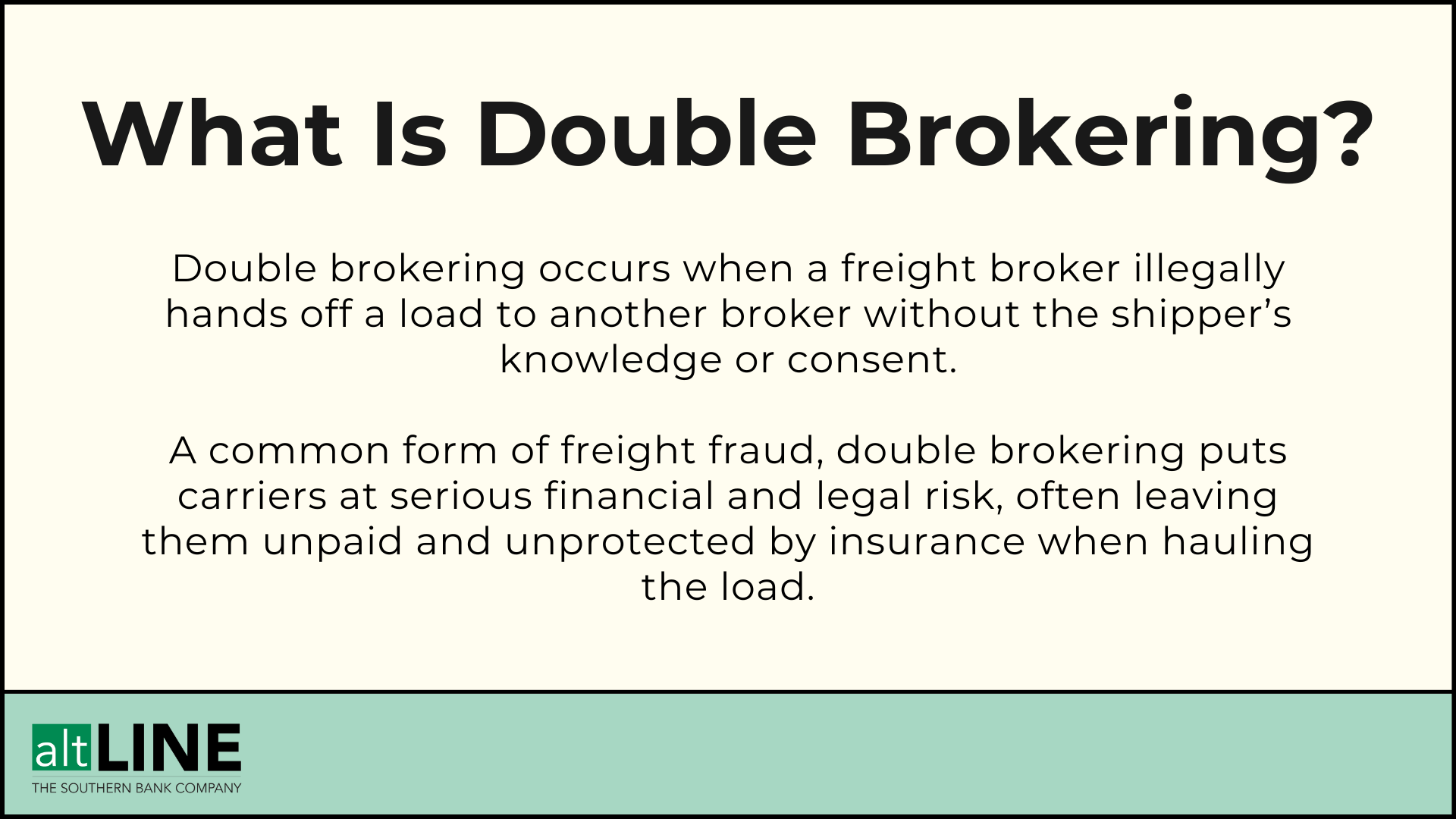Last Updated November 3, 2025
Turn your unpaid invoices into working capital for your business
While the trucking industry is heavily regulated, sometimes, brokers don’t play by the rules. A common illegal practice carried out by freight brokerage companies is the act of double brokering.
This can be for many reasons. Perhaps they have stretched themselves thin with a hectic schedule, lack the funds to operate by the book, or are just willing to do whatever it takes to make more money.
Double brokering is a scam that everyone in the trucking and logistics industries should be cognizant of, and that goes beyond just learning the meaning of double brokering. Learning how to detect double brokering and how to report double brokerages will also help you avoid getting duped by brokers and ensure you’re responding appropriately if it does occur. Continue reading to protect your business.
Key Takeaways
- Double brokering in trucking is an illegal scam where a freight broker secretly reassigns a shipment to another broker without the shipper’s approval.
- Double brokering violate FMCSA regulations and can result in severe penalties, including fines, loss of brokerage authority, and even criminal charges.
- When carriers work with double brokerages, even unknowingly, they run the risk of not getting paid, losing insurance coverage, and facing liability for damages on double-brokered loads.
- To prevent double brokering, verify broker credentials, check MC numbers, watch for suspicious rate confirmations, and report fraud to the FMCSA immediately.
What Is Double Brokering?

Double brokering is an illegal practice in the freight industry. It occurs when a broker that’s signed a contract with a shipper passes on the shipment to a different broker unbeknownst to the shipper. As a result, the “secondary broker” is the one actually completing the work while the original broker takes a backseat, despite fronting as the one doing the work.
The secondary broker might present themselves to the carrier as the one managing the shipment of the goods, when in reality the contract was signed to a different broker company.
Why Does Double Brokering Occur?
Freight brokers might resort to double brokering for a few different reasons. Most commonly, they might find themselves with an overbooked schedule, meaning they are too busy or don’t have enough hands on deck to manage the transportation of the goods they agreed to help transport. Therefore, they utilize a different broker to do the work for them.
Is Double Brokering Illegal?
Yes, double brokering is very much illegal. It is against FMCSA legislation and can lead to severe penalties beyond just brokers not getting paid for their work.
Why Is Double Brokering Illegal?
Double brokering is illegal because the other parties involved in the transaction are completely unaware of a second broker’s involvement, which goes against contractual agreements.
More importantly, double brokering puts carriers at severe financial risk of not being paid for their work as well as liability-related risk given that double-brokered loads become uninsured. Given the shipment was transported illegally, insurance companies won’t be required to assist carriers in case help is needed. Therefore, if a load is lost or damaged, an accident occurs, or an accident causes physical injury, it puts carriers in serious jeopardy of losing their trucking business entirely.
Penalties for Double Brokering
Double brokering scams come with serious penalties. These include:
- Not getting paid for the shipment.
- Fines of up to $10,000 per instance of double brokering.
- Loss of brokerage authority and operating licenses.
- Expensive legal fees for all parties involved.
- Criminal charges and even imprisonment, depending on the nature of the case and the jurisdiction’s respective laws.
Furthermore, since double brokering makes the respective load uninsured, any potential damages aren’t covered.
Carriers who work with double brokerages put themselves at great risk, even if they do so unknowingly.
How to Detect Double Brokering
There are a few telltale signs of a double-brokered load, including:
- When brokers request carriers to check in with shippers under a name other than their own.
- When a different carrier or broker’s name is on the bill of lading (BOL).
- When the load has an unusually high rate.
- When BOL details don’t match rate confirmation details. The broker’s information on the rate confirmation should match what is listed on the FMCSA or FMCSA’s SAFER resource.
According to Jennifer Fink, altLINE freight factoring operations manager, you can also detect double brokering via paying attention to MC numbers.
“Double brokering comes into play when you’re running under your own MC, but a carrier gives you a load under their MC,” Fink said. “That signals double brokering. The only way it wouldn’t be double brokering is if you are leased on to the other carrier’s MC number, which is legal.”
What Carriers Can Do If They Transport a Double Brokered Load
From the carrier’s perspective, transparency is key once it’s discovered you were involved in shipping a double-brokered load.
This first involves notifying the shipper and receiver of the load immediately. It’s common that whoever pays the freight bill is equally unaware of the double brokering. If this is the case, the payor will forward payment to the carrier directly rather than the broker(s) at fault. It will then become apparent to the shipper that they’ve been working with a fraudulent company and moving forward they will not receive any further shipments from the broker they’ve been working with.
How to Report Double Brokering
It’s important for carriers or other affected parties to know how to report double brokering, so they don’t become liable or considered at fault for the situation.
The FMCSA has a specific resource with steps on how to report fraudulent activity. When it comes to double brokering, they advise carriers to gather all evidence possible, including identifying who is paying the freight on the load and contacting their brokerage company. Then, they can file a complaint with the FMCSA online or by calling 1-888-DOT-SAFT (1-888-368-7238) Additionally, carriers can seek out legal advice and consider filing a lawsuit if they deem the freight fraud is significant enough to warrant doing so.
How to Prevent Double Brokering
Unfortunately, there’s no way to 100% protect your company from a double-brokering scheme. But there are measures you can take to significantly reduce the chance of it happening.
You can do your best to prevent double brokering by:
- Checking your freight brokers’ credit scores before working with them
- Meticulously reviewing contractual details and rate confirmation
- Keeping an eye out for abnormally high rates
- Reading online reviews and discussions of brokerage firms on trucking forums, Reddit, Google, etc. (if available)
- Consulting with industry friends or peers to see if they’ve worked with the brokerage before
Interested in Factoring?
Turn your unpaid invoices into working capital so you can keep growing your trucking business.
Double Brokering vs. Co-Brokering
Double brokering is not to be confused with co-brokering.
Double brokering is an illegal offense involving a broker passing a shipment to a separate broker without notifying the other parties involved in the transaction. Co-brokering, however, occurs when a broker gets approval from the shipper to work with another broker to complete the haul more efficiently.
Co-brokering might occur in instances where the primary broker doesn’t have all of the capabilities required to manage the shipment as planned. Permission can then be granted by the shipper to utilize the assistance of a secondary broker, with the hope that the combined resources of both companies improve the process overall.
In-Summary: What Is Double Brokering?
Double brokering is a shady practice that everyone in the trucking industry should learn how to detect and report.
As a carrier, you deserves full transparency from the brokers you’re working with, so don’t be afraid to report double brokerages to the FMCSA and read up on double brokering laws to see what measures you can take in retaliation if it does occur.
Double Brokering FAQs
What is a double-brokered load?
A double-brokered load is a shipment that, unbeknownst to the carrier, is passed on from one freight brokerage company to another brokerage company to handle.
Can you go to jail for double brokering?
Yes, penalties for double brokering include possible imprisonment depending on the jurisdiction it occurs in and its relative laws. Other significant penalties for double brokering include five-figure fines and loss of brokerage license.
Who is responsible for damages on a double-brokered load?
The carrier is responsible for any damages on a double-brokered load or any physical injury in case of an accident. This is what makes double brokering so risky and unfair to carriers who are completely unaware that their shipment has been re-brokered.
Michael McCareins is the Content Marketing Associate at altLINE, where he is dedicated to creating and managing optimal content for readers. Following a brief career in media relations, Michael has discovered a passion for content marketing through developing unique, informative content to help audiences better understand ideas and topics such as invoice factoring and A/R financing.










